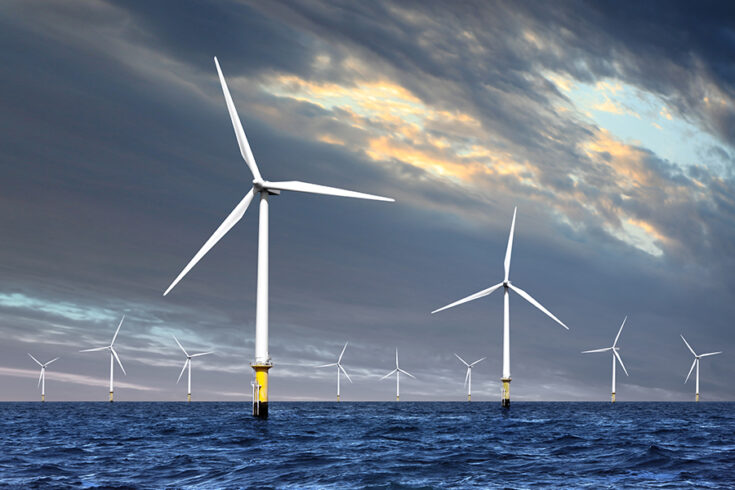The UK is the world leader in offshore wind energy, with more capacity installed than any other country. Offshore wind powers over 7.5 million UK homes, and a planned fourfold increase by 2030 will generate more electricity than is currently used in UK homes.
The sector is an engine of clean growth, produces millions of pounds of tax revenues, creates thousands of jobs in coastal communities where levelling-up is a priority, and is a key enabler of the UK’s first-in-world commitment to net zero greenhouse gas emissions by 2050.
Crucially, all this activity has not come at an unacceptable environmental cost. The UK’s ability to exploit opportunities also comes with the need to safeguard marine mammals, birds and habitats.
About the projects
Decades of NERC investment – in research and innovation, infrastructure, long-term monitoring and surveying, targeted training, knowledge exchange and partnership-building – have underpinned a thriving UK offshore wind industry. Our science delivers ‘big picture’ insights plus effective solutions to challenges at specific sites.
Past investments include:
- funding for long-term monitoring, for example the Isle of May Long-Term Seabird Study, which started in 1973 and is still running
- £2.4 million together with the Department for Environment, Food & Rural Affairs (Defra) in the Marine Renewable Energy Research Programme, from 2011 to 2015
£3 million from 2016 to 2021 in the Offshore Renewable Energy Knowledge Exchange Programme.
Impacts of the projects
NERC science is one of the keystones of this remarkable success story. It delivers a powerful combination of innovation, insight, rigour and impartiality that minimises risks and maximises benefits for all of the sector’s stakeholders.
Government gains
NERC science is providing tools to drive further sector expansion while protecting the environment. This includes long-term detailed datasets and world-leading models that enable governments to identify the most appropriate sites for offshore wind farm development and to take evidence-based decisions on applications by developers. Areas include:
- seabed geology, from the British Geological Survey (BGS)
- seabirds, from UK Centre for Ecology & Hydrology (UKCEH)
- seals, from the Sea Mammal Research Unit (SMRU).
The novel solutions developed through targeted environmental research supported by NERC and others have been instrumental in ensuring the sustainable development of offshore wind in Scotland.
Marine Scotland Science, Scottish Government
Business growth
NERC-funded research has enabled evidence-based assessments for new wind farms. SMRU has provided robust data which companies such as Ørsted UK have relied on within their Environmental Impact Assessments to support consent applications for new offshore wind farms.
Detailed knowledge of the local seabed and hazards has enabled companies to optimise wind farm construction. The BGS models have allowed projects to better predict hazards, refine foundation design and optimise wind farm layout. All of these contribute to reducing the cost of offshore wind farm development.
Accessible expertise
NERC-funded research is delivering reliable, impartial resources that are freely available to all. This includes location-specific scientific knowledge which helps communities and organisations to weigh up the potential impacts of offshore wind projects.
UKCEH’s work on internationally important seabird colonies is invaluable not only to the RSPB but also to industry, statutory decision-makers and the conservation of our marine environment.
RSPB
A world-leading computer model developed by the National Oceanography Centre (NOC) underpins the UK Renewables Atlas. This independent assessment of marine energy resources was accessed nearly 4,000 times in 2020 by organisations including charities and research institutes.
Beyond offshore wind with more marine energy
NERC science is also supporting the growth of the UK wave and tidal energy sector, which is less developed than offshore wind. Ground-breaking programmes have brought together researchers, government and industry to address key knowledge gaps and
risks.
For example, new environmental monitoring techniques have helped MeyGen in Scotland – the world’s biggest planned tidal stream project – to fulfil consent conditions and set up cost-effective and reliable monitoring. These techniques were developed by:
- SMRU
- the University of Aberdeen
- the University of the Highlands and Islands
- the FLOWBEC-4D consortium.
Investing for the future
NERC continues to support research, training and innovation that will benefit the offshore renewables sector and so deliver clean growth. Recent investments include ECOWind, a £7 million programme with The Crown Estate and Defra to investigate how marine ecosystems will respond to the continued growth of offshore wind alongside other pressures such as climate change.
Behind the science
Dr Julie Miller – Harnessing science to protect the environment
As Senior Marine Ornithologist at Marine Scotland Science, Julie applies skills developed during her NERC-funded PhD to advise the Scottish government on the effects of marine renewables on seabirds. Julie acts as a bridge between academic research and government decision making, working closely with researchers, nature conservation bodies and industry to identify the latest scientific insights.
Dr Kerry Marten – Providing vital evidence to optimise developments
In her role as Senior Scientist at HR Wallingford, Kerry uses skills developed during her NERC-funded PhD to advise offshore wind companies and regulators on erosion around wind turbines and cables. By modelling and monitoring the effects of scour, she helps companies to save money and maximise energy production by planning developments effectively and spotting problems early during operation.
Top image: Offshore wind turbines. Credit: Getty Images.

